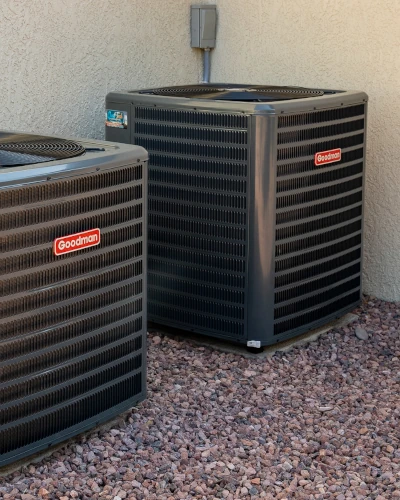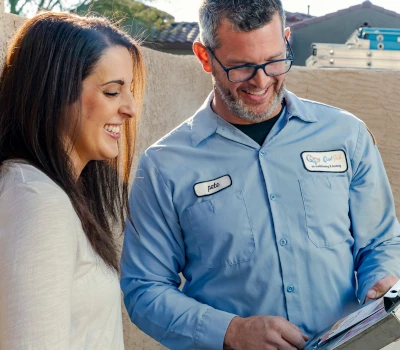- ROC#246700/271343
Choosing the right AC system is critical in Arizona’s intense heat. This AC buying guide highlights the key factors that matter most for comfort, efficiency, and long-term value in your home.

If the unit is too small, it won’t cool properly. Too large, and it cycles inefficiently and wears out faster. Correct sizing is the single most important factor—it affects comfort, energy use, and equipment life. If you want to know how much cooling you need, then you refer to your home’s square footage.

In Arizona’s extreme heat, high SEER2 ratings are especially valuable. They measure energy efficiency—higher numbers mean lower cooling costs. A high-efficiency unit is worth the investment if you use your AC often or plan to stay long-term.
High-efficiency units are ideal when:

Choosing the right AC system type is one of the most important decisions for comfort and cost. In Arizona’s heat, the wrong choice can mean uneven cooling, energy waste, or unnecessary expense. Your home’s size, layout, and whether it has ductwork will determine which system is the best fit.
Central Air (Forced Air)
Great for large homes with ducts. Delivers consistent cooling to all rooms and works with existing HVAC infrastructure.
Ductless Mini-Split
Ideal for homes without ducts or for room additions. Energy-efficient and allows independent temperature control per room.
Window Unit
Budget-friendly option for cooling a single room. Easy to install and remove, great for apartments or temporary needs.
what makes QUAL-TECH different?
Our technicians are not salesmen. They fix air conditioning systems and provide an unbiased assessment of your system's condition.
Our philosophy is based on treating customers the way you want to be treated. Your comfort and budget are our top priorities.
When your technicians are focused on quality work, you take the time to do the job right. Everyone's happy.
We're licensed, bonded, and insured for YOUR protection first. And of course, our work is guaranteed.
Don’t let the summer heat take a toll on your comfort. Contact us today for reliable residential AC service and enjoy the difference that expert care can make. Our experienced technicians are here to ensure your home stays cool, comfortable, and energy-efficient all season long. Regain your peace of mind and beat the heat—schedule your AC service today.

Fill out the form below with your info and preferred date of service and we’ll contact you to confirm! Hate forms? We get it! Call us direct: (623) 234-3608
DO NOT use this form to sell us. When we need you, we’ll find you. Thanks.
Fill out the form below, and one of our helpful representatives will call you back right away to set up your plan. Can’t wait? Call us directly (623) 234-3608
Fill out the form below, and one of our helpful representatives will call you back right away to set up your plan. Can’t wait? Call us directly (623) 234-3608